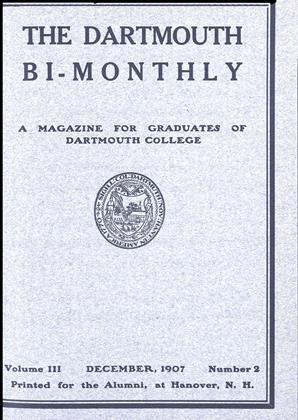Congressman Theodore E. Burton, LL.D. '07, gave two very interesting lectures at Dartmouth, November 19 and 20, the first on "River and Harbor Improvements in This Country," and the second on "Some Political Tendencies of the Day."
Known as the most scholarly member of the House of Representatives, Mr. Burton is a lawyer by profession, and has been chosen to represent his district at every election since 1895. As Prof. J. K. Lord said in introducing him, he is probably the best qualified man in this country to speak on the subject of our waterways, for he has been for a long time chairman of the Rivers and Harbors Committee for the House, and last spring was appointed by President Roosevelt, chairman of the new Inland Waterways Commission.
Mr. Burton began his lecture by showing the methods used by different countries for making improvements in transportation facilities. In England, he said, improvement is left entirely to municipal and private enterprise, which collect tolls to pay for the expense. In France the central government makes all improvements, dredg- ing, building docks, and so forth, and collects tolls to meet the expense. Here in the United States the central government makes limited improvements such as dredging, and levies no toll charges, making transportation cheaper than in the other two countries.
Since 1902 these improvements in the United States have been supervised by a Board of Engineers from the regular army, which makes close examinations of the necessity of improvements and reports to the Committee of Rivers and Harbors,, whence the House and Senate vote the necessary appropriations. Between twenty and twenty-five million dollars is spent annually on River and Harbor improvements, exclusive of any irrigation waterways, and the policy of the Board is to make extensive improve ments in a few places, rather than waste a limited amount of energy on too many places.
Much discussion is heard today on the question whether the state or national government should make these improvements. To those who have studied the question carefully it is clear that the national government should control the work. This is so because many of the projects are interstate affairs, such as building canals or dredging rivers, and it would be difficult for neighboring states to cooperate well in accomplishitfg needed improvements. However, a great deal of improvement is left in the hands of the state government.
Mr. Burton then passed to the discussion of the advantages and disadvantages of river and canal transportation. He showed that it was cheaper than by rail, through the absence of real estate and roads, that it was more easily maintained, and that it was necessary because the railways would never be adequate to carry all the traffic of our country. The greatest disadvantage of river transportation comes from the great variation of the level of our rivers with their winding beds and shifting channels, which makes the tug and barge method difficult, since they cannot go in circuitous courses. Then, too, our rivers are so scattered that continuous waterways from east to west are impossible. Thus it is necessary to have a combination of land and inland water traffic, and Mr. Burton said that in the future both of these methods of transportation will greatly increase through their mutual co-operation.
In his second lecture, Mr. Burton summarized the current political tendencies as follows:
First, there has been an increase of the power and scope of the central and federal government mostly due to the closer communication between states and communities, but also stimulated by the greater confidence in the efficiency of the government at Washington.
Second, a greater relative attention has been given to local and individual interests to the detriment of great issues. This is largely due to the fact that great problems, which appeal to the people, such as the question of slavery and the preservation of the union, are not now before the public.
Third, the problem of municipal government presents serious difficulties. The great increase of the population in cities threatens to change the center of political force, which has been so salutary in the past history of the republic. In cities the "boss" gains a foothold and possesses a power altogether dangerous to the orderly, and certainly to the ideal control of affairs.
Fourth, the discontent because of the accumulation of great fortunes and the growing power of corporations is important. This question must be solved temperately with a full realization that industries and commercial fields must afford an opportunity for honest ambition and that business operations must be conducted on a large scale, but at the same time with insistence that equal opportunity be given to all and that dishonesty must be punished promptly and severely.
 View Full Issue
View Full Issue
More From This Issue
-
 Article
ArticleTHE CHANDLER AND OTHER ENDOWMENT FUNDS FOR SPECIFIED USES*
December 1907 -
 Article
ArticleThe north end of the College Green with its prim white church
December 1907 -
 Article
ArticleTHE HARVARD GAME
December 1907 By Eugene R. Musgrove '05 -
 Article
ArticleCOLLEGE NOTES
December 1907 -
 Article
ArticleSCHOLARSHIPS AND PRIZES
December 1907 -
 Article
ArticleFRATERNITY ELECTIONS
December 1907








